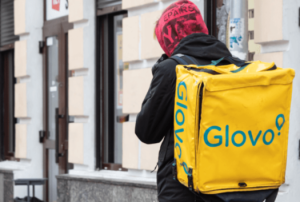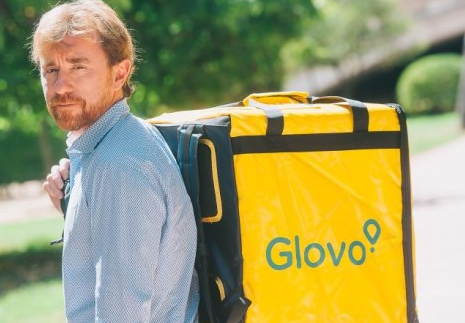SME Magazine catches up with Sacha Michaud, above, Co-Founder at Glovo, on connecting customers, businesses and couriers, while making sure they have a sustainable impact on communities and ecosystems
Sacha, can you start by telling us about yourself, your role and business journey
I’m an English/Canadian entrepreneur with more than 25 years of experience in the online sector and been very lucky to have been part of creating some amazing companies. Prior to Glovo, I founded the company LatinRed, one of the largest providers of internet services in Spanish, and then acquired by StarMedia three years later. During my career, I’ve founded several companies, including Inlander, which was sold in 2000, Binaria, a successful digital communications agency, Servidores.com, a hosting company and Transword, an online translation company. I was also part of the early leadership team of Betfair, now Flutter Entertainment which has become the largest publicly traded gaming company in the world, during this journey I have also been part of two publicly listed companies floating on the LSE and Nasdaq.
In 2015, I joined up with Oscar Pierre to co-found Glovo, a pioneering tech platform connecting users with businesses, and couriers, offering on-demand services from local restaurants, grocers, supermarkets, pharmacies and high street retail stores. Glovo’s vision is to give everyone easy access to everything within their city, and over the years, it has gone from strength to strength. We operate across 25 countries, in 1,500 cities in Europe, Asia and Africa.
How do you see the delivery and q-commerce industry evolving in 2024?
As we enter the era of instant convenience, more businesses will need to adapt to their customers’ on-the-go routines and offer options for delivery that will provide efficiency in their day-to-day lives.  We’re seeing a growing trend around giving customers visibility to goods that are nearby. Not only will this be quicker and more convenient, but it is better for the planet as customers will receive their goods from local businesses. To enable this, prioritising the digital sales channel will be crucial for small and local businesses to increase visibility and revenue, as well as allowing them to compete with the huge e-commerce platforms.
We’re seeing a growing trend around giving customers visibility to goods that are nearby. Not only will this be quicker and more convenient, but it is better for the planet as customers will receive their goods from local businesses. To enable this, prioritising the digital sales channel will be crucial for small and local businesses to increase visibility and revenue, as well as allowing them to compete with the huge e-commerce platforms.
We also expect to see q-commerce continue to expand beyond food and grocery as more categories start exploring rapid delivery this year, especially with customers demanding easy access to retail items including electronics, health products, flowers and even pet supplies.
What key trends should entrepreneurs be aware of in 2024?
This year will be key for UK and European entrepreneurs, particularly those focused on tech. As tech evolution accelerates, the ecosystem is poised for positive changes. The recent boom in AI means that innovation and execution will be much faster and utilise fewer resources, which frees up employees to focus on high-level strategy work. By harnessing AI, SMEs will be able to develop at a faster pace, utilising software and tools to augment business processes to run more efficiently, as well as boost the overall customer experience. AI will also impact how customers interact with technology, and therefore will unlock new, creative opportunities for entrepreneurs.
AI is undoubtedly the next step in the digital revolution and businesses who fail to embrace it in the year ahead could risk falling behind. While the EU AI Act has been provisionally approved and the UK is taking a pro-innovation approach, many of the details are yet to be finalised so this will present a fresh set of challenges for SMEs to adapt to. Much of the hype in recent months has concentrated on generative AI and as 2024 gets into full swing, SMEs will likely see more opportunities for wider applications. There will be some amazing tools available for SMEs to interact better with their customers online.
In addition to this, we’re seeing a real increase in momentum within businesses to be more sustainable and in 2024, SMEs have a responsibility to enable customers to make more green choices. When it comes to delivery and commerce, in particular, SMEs in this space can provide sustainable packaging for orders. This is a key priority for us at Glovo and it’s exciting to see how innovative technology can help businesses of all sizes to execute this vision of a sustainable future.
What other challenges do you anticipate that entrepreneurs will face this year?
2024 promises an exciting environment, especially for those entrepreneurs and leaders who excel in execution, maintain low costs and prioritise scalable and profitable business models. While there will be some hurdles due to a reduction in available capital, this will lead to less competition, allowing entrepreneurs with solid projects and talented teams to shine.
 As a Spain-based business, Glovo didn’t have access to the same funding network as companies from the top European tech hubs when we launched and many early-stage tech companies will be facing the challenge of being very efficient with their capital, this is not necessarily negative as it more focused and agile companies will be being built.
As a Spain-based business, Glovo didn’t have access to the same funding network as companies from the top European tech hubs when we launched and many early-stage tech companies will be facing the challenge of being very efficient with their capital, this is not necessarily negative as it more focused and agile companies will be being built.
For business leaders that are realistic, practical, and proactive, 2024 offers a promising start for those embarking on their entrepreneurial endeavours and for the savvy-minded startups looking to scale their business.
What can larger businesses do to better support SMEs?
SMEs are the pillar of our global economy, however, they are facing ongoing economic struggles and challenges posed by complex regulations, inadequate digital infrastructure and a scarcity of digital talent and skills. Through knowledge sharing, established businesses can help upskill SMEs and improve their work processes to ensure they don’t get left behind.
Just 20% of SMEs in the markets where Glovo operates sell via digital channels, resulting in a huge potential for them to increase efficiencies and tap into new customer bases. To address this, larger businesses must bolster SMEs to ensure they can thrive in the digital world. At Glovo, we recently teamed up with Visa to launch a series of online training courses to empower aspiring local businesses with vital business skills and support existing SME owners in streamlining their current practices and expand. The course videos cover a range of crucial business topics, including digital payments, marketing campaigns, social media, and money management.
In addition, larger businesses must continue to champion events and initiatives that are focused on promoting entrepreneurs and small businesses. For example, Glovo is actively involved in running and supporting startup competitions, particularly those that promote women in entrepreneurship, tech innovation and green initiatives. These events and competitions along with mentorship schemes with top leaders are hugely important for aspiring entrepreneurs as it will allow them to grow their network and build connections that will help support them on their journey.


